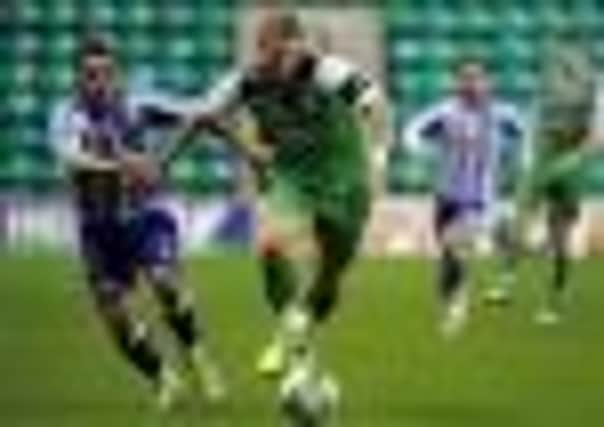Hibernian 1 - 1 Kilmarnock: Sluggish Hibs leave Shiels cold despite share of spoils


“They should be fighting for Europe every year and they have been underachieving,” said Shiels, who is on loan at Kilmarnock from Doncaster, the club for which he left Easter Road in 2009. “The stadium looks fantastic and I was at Hibs when the training ground was built.
“They should be third or fourth every year. That was the expectancy when I was there, but they are not meeting those expectations at the minute.
Advertisement
Hide AdAdvertisement
Hide Ad“Mr Petrie [the club chairman] does a great job and runs the club well off the pitch. But on the pitch in recent years, they haven’t had good enough players and it hasn’t worked for the managers they have brought in. For what reason, I don’t know.”
Shiels is far from being the only one to have that assessment of the playing staff. Manager John Hughes thought some of his players were not good enough, so brought in Edwin de Graaf and Valdas Trakys. Hughes’ successor, Colin Calderwood, thought the players he inherited were not good enough, and those he discarded included De Graaf and Trakys.
Calderwood was at Easter Road long enough to realise that some of his own recruits were not transforming the team in the way he would have liked. And now, if only for a game or two, caretaker boss Billy Brown has a chance to deliver his own verdict on the squad.
He does not have any room for manoeuvre at the moment, and if he gets the job he will have to wait until January to bring in reinforcements. But at least in this game he took some measures that showed greater organisational nous.
Solidity was the aim, and it was achieved by the end, albeit after a first half in which Hibs looked more like a lime jelly than a football team. The selection of a back four in which each man was in his proper position had been a priority for Brown, and that department functioned reasonably well, even though right-back Michael Hart was never going to last the whole game on his return from injury.
The five-man midfield in the first half was less successful, with Lewis Stevenson and David Wotherspoon failing to function properly as the defensive duo in the quintet. If Leigh Griffiths had been able to start up front, Brown would surely have gone for a 4-4-2 from the outset rather than from the start of the second half.
He could still have fielded that formation from the beginning by picking Junior Agogo alongside Garry O’Connor up front, but, significantly, the Ghanaian striker was an unused substitute instead. Calderwood signed Agogo having worked with him previously at Nottingham Forest, and at times seemed to believe that the much-travelled forward could transform the fortunes of the team. Brown is aware that such a big task is beyond the powers of any one man.
Had they gone in at the break more than a goal down, as well they might, recovery would probably have been beyond the ability of Hibs collectively. They were fortunate, however, to meet Kilmarnock on a day when a groin strain greatly restricted Paul Heffernan’s contribution.
Advertisement
Hide AdAdvertisement
Hide AdHeffernan only lasted till half-time, and both with him and without him Kilmarnock’s fire power was badly depleted. They played the better football throughout the game, and were particularly dominant in the first half, but simply did not create enough scoring chances.
The goal they did score, ten minutes before the break, came about thanks to a goalkeeping error. Danny Buijs’ shot from 15 yards out was knocked by Graham Stack into the path of Manuel Pascali, who side-footed into the net with his right foot from three yards out.
Griffiths, who had been suffering from gastro-enteritis, came on for the second half along with Richie Towell, and within four minutes had Hibs level. This time the goalkeeper played an even bigger part in the goal, as Anssi Jaakkola fumbled a low cross by Ivan Sproule, allowing Griffiths to nip in and net from a narrow angle on the left.
A few minutes later the same player had the chance to lay on a scoring opportunity for Towell, but shot into the side netting instead of squaring the ball to his fellow-substitute. That was the high point of the contest for Hibs, who thereafter did little to trouble Jaakkola.
Stack, it should be said, was not much busier at the other end, though he appeared fortunate not to have to face a penalty after centre-half David Stephens nudged Buijs off the ball. Referee Steve Finnie showed no interest in the incident, but Stephens, who had been booked in the opening minutes, was nowhere close to being in control of the ball.
The loss of a goal and a man at that stage, 25 minutes from time, would have been hard for Hibs to take. As it was, they held on for a point, which they felt their second-half efforts deserved, even if Kilmarnock thought the result an unfair reflection of their domination.
“We feel gutted, because it’s two points dropped,” Shiels added. “The only shot they had apart from their goal was from O’Connor, a trickler from 30 yards. It was really disappointing to only get a point. We need to do more in the final third. “
Heffernan’s return to full fitness will ensure that they do. As for Hibs, they need to do more in every part of the field, and in both halves of the game. But given all they have been through, and those limitations of which Shiels spoke, this was not a bad beginning to Brown’s time in charge.